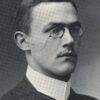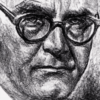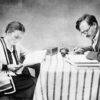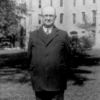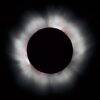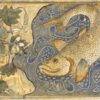Tag: Barth
The Christological Men: Karl Barth and TF Torrance
Barth and TF Torrance are the only modern theologians I have come across who if you don’t start with radically construed Chalcedonian premises, you won’t get. Their dialect is strictly christologically conditioned all the way down. This is one reason I think so many evangelical and conservative theologians of today write them off as incoherent. For example, theologians who harvest purely from the Post Reformed orthodox (pro), and some of the mediaeval theologians, will attempt to read Barth and TFT through the speculative, decretal categories they have imbibed vis-à-vis their recovery of said pro and med. theologians. And yet, this…
Barth against the Barth Scholars
I’m starting to believe as I continue my trek through the 6M words of Barth’s CD that many young (and some old) so-called Barth scholars have never read through Barth’s CD. There are things in there about history, the resurrection, so on and so forth that completely emaciate any claim that Barth did not believe in a bodily, historical resurrection of Jesus Christ. How Barth thought of history, through Christ, ends up being different than the historicist vision. Even so, for Barth it is bodily, historical, history delimiting and primordial event. The way Barth takes Bultmann to task directly, in…
On Being a Real Protestant: Calvin and Barth against Thomas and the Thomists on a Vestigial Knowledge of God
Is God really knowable, secularly, in the vestiges of the created order? In other words, does God repose in the fallen order to the point that vain and profane people can come to have some type of vestigial knowledge of the living God? According to Thomas Aquinas, and other scholastics of similar ilk, the answer is a resounding: yes. Here is Thomas himself: as we have shown [q. 32, a. 1], the Trinity of persons cannot be demonstratively proven. But it is still congruous to place it in the light of some things which are more manifest to us. And…
Barth on Adultery in the Church Dogmatics and 1 Corinthians 11
Photo copyright of the Karl Barth-Archiv in Basel, Switzerland Almost seven years ago now I wrote a post based on Christiane Tietz’s just released essay (at that point) where she offers some of Karl Barth’s and Charlotte von Kirschbaum’s love letters, translated for the first time from their original German into English. My initial blog post ended up going relatively “viral” in the theo-blogosphere, and eventually, beyond. My post, and then series of posts, was referred to by an article written by Mark Galli at Christianity Today, and then at Mere Orthodoxy and other like outlets online. A little later my…
H.A. Ironside and Karl Barth On: “There is no Man Behind the Back of Jesus”
How blessed is the man who does not walk in the counsel of the wicked, Nor stand in the path of sinners, Nor sit in the seat of scoffers! 2 But his delight is in the law of the Lord, And in His law he meditates day and night. Psalm 1:1-2 What does it mean to be genuinely human? This is a question philosophers, world religions, little kids, and others have been pondering for the millennia. Rather than speculate though, as Christians we have the more accurate way, the more concrete way; God’s way for answering said question. As is the case with everything in the Christian kingdom, our…
Karl Barth and Thomas Torrance, The Modern Versions of Duns Scotus and William of Ockham?
When engaging the theologians, it is an important exercise to broaden out the frame, every now and then, in order to get a greater, even critical understanding of just who we might be engaging with. This holds true for any of the theologians, including Karl Barth and Thomas Torrance (the two modern theologians who, of course, have had the greatest purchase in my life over the last, almost, two decades). In an effort to expand the scope on the way we might respectively approach Barth and Torrance, I wanted to offer some words from ecclesial intellectual historian, the late, Steven…
How the Inscrutable unReality of Darkness Keeps Barth and the Athanasian Reformed from Incoherence and a Dogmatic Christian Universalism
I want to talk about God’s shadow side. The rip against Thomas Torrance, Karl Barth and the Athanasian Reformed is that their respective doctrine of election leads to some form of Christian universalism (some are okay with that). But in fact, it doesn’t. People like Keven Vanhoozer, Robert Letham, Roger Olson et al. have critiqued Torrance, Barth, and Evangelical Calvinists, like myself, with reference to what they take to be our theological Achilles heel. Because they think from within an Aristotelian or Stoic theory of causation in a God-world relation, they cannot imagine how the Evangelical Calvinist, after Barth, Torrance…
Reading Barth as a Jonah: My Strategy for Reading Barth
I’ve been struggling, conflicted, whatever you want to call it, since 2017, with reference to what to do with Barth. I publicly began this struggle here at the blog, and you can read that series of posts here. Unlike many, like the recent TGC post on Barth and Von Kirschbaum, I have skin in the game. I’ve been reading Barth since 2002, and on him for just as long. I am a proponent of many of his theological themes, particularly his doctrine of election (which of course, impinges on everything else). This might sound melodramatic, but I’ve been wrestling with…
Barmen, Barth, and Agamben against BigMedicine as State Church
I was just re-reading the following post which I originally posted on September 13, 2021. I was looking for a post that got into the role that natural theology and no-natural theology plays in regard to Christian praxis vis-à-vis the state. This particular post has to do with BigMedicine, and what I call, along with Agamben, a new religion. Really it isn’t new at all though. Hitler rationalized that what he was doing, in pushing forward his third reich, was being done in the name of medical and scientific advancement (thus cultural advancement ushering in a new millennium where he would be…
Election. John Owen in Conversation with Barth and Torrance
Here’s a post I found in my drafts from 2013, not sure if I ever posted this. Election. Election has been such a source of consternation for so many of us through our own theological years. The battle continues to fray on and on between the rascally classical Calvinists and Arminians—at least in its most popular expression—there is a trading of proof texts that sail right past each other as two ships in the dark navigate precariously past one another. There is a more sophisticated way to engage with this tumultuous topic. I like to think that Myk Habets and…
